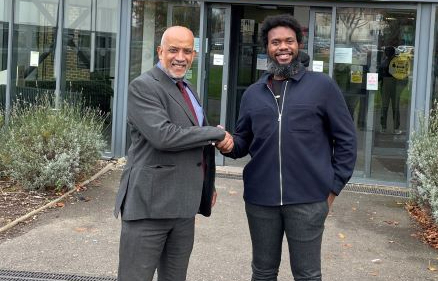Uxbridge College computer science graduate joins Abbey Road Studios tech program – FE News
[ad_1]
A senior level computer science graduate from @uxbridgecollege is working with Abbey Road Studios to develop an AI (Artificial Intelligence) system to help artists write their lyrics.
Micah Brown, who graduated from the HND (Higher National Diploma) computer science course in 2009 and then moved on to the final year of a degree at Brunel University in London, entered the College to lecture on the invention “BrainRap “.
Micah also organized a visit to Abbey Road to demonstrate the technology for music students of the UAL Level 3 Extended Diploma in Music Performance and Production, and HND computer science students.
BrainRap – developed in partnership with deep learning engineer CJ Carr – “listens†and analyzes an artist’s work and generates suggested lyrics. The duo came up with the idea at a Massachusetts Institute of Technology (MIT) hackathon software development event, and the idea is now being developed at music technology incubator Abbey Road Red.
Dr Darrell DeSouza, CEO and Principal of the HCUC Group, said: “Micah’s energy and creativity is undoubtedly an inspiration, and it was fascinating to hear about the BrainRap invention and see it in action. This shows how an incredible range of opportunities can come from studying technical qualifications such as the HND in Computer Science at Uxbridge College, Harrow College and West London Institute of Technology.
Micah said: “It was so great to be back at Uxbridge College and meeting some of the students today and seeing the staff again as well. College has really helped me on my way, and without it I’m 100% sure I would never be where I am now.
Abbey Road has hosted some of the world’s most famous recordings including The Beatles, as well as Pink Floyd, Kate Bush, Kanye West, Amy Winehouse, Kylie, Muse, Sam Smith, Florence + The Machine, Ed Sheeran, Frank Ocean, Lady Gaga and Adele. He also paved the way for music technology with some of the key technological breakthroughs in music, including the invention of stereo sound by EMI engineer Alan Blumlein, patented in 1931.
Micah added, “BrainRap and its underlying neurosentment technology represent the future of the mental web – the ability to harness consciousness to enhance human-machine interaction in digital environments – in this case, music creation. “
BrainRap deconstructs both the phonetic characteristics and the literal meaning of words and phrases to come up with a series of related words and phrases. The artist can incorporate suggestions into their feed, use them for inspiration, or ignore them altogether.
The invention can also be used in conjunction with the “BrainBit†EEG headset, which monitors brain waves and links the data to the suggestion process.
Recommend0 recommendationsPosted in Skills and learning
[ad_2]


Comments are closed.